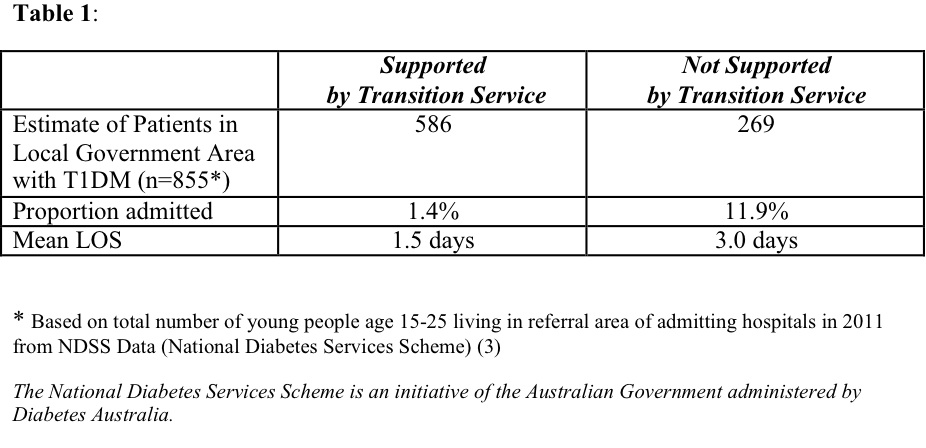Oral Presentation Australian Diabetes Society and the Australian Diabetes Educators Association Annual Scientific Meeting 2014
Access to a Transition Diabetes Service for Young Adults with Type 1 Diabetes (T1DM) Reduces Frequency and Length of Stay of Diabetic Ketoacidosis (DKA) Admissions. (#57)
Introduction
For young adults with diabetes, admission to hospital is often stressful and prolonged admissions are both costly and impact on available hospital resources. Research has demonstrated that engagement of young adults with a dedicated diabetes transition service has resulted in better outcomes, including decreased hospital admissions and readmissions for DKA(1, 2). We propose that length of stay (LOS) for DKA may be reduced in patients who are linked to a young adult transition service compared to those who are not.
Methods
Presentations to four metropolitan hospitals in Western Sydney for DKA in young adults, age 15-25 years, with T1DM, were evaluated between January and December 2011. Two of the hospitals offered a specific transition clinic service. Descriptive statistics were used to assess population data and Mann-Whitney U tests were used to analyse the relationship between young adult clinic attendance and variables of LOS and DKA severity. Total numbers with T1DM from the referral population were obtained from NDSS data (3).
Results
During 2011 there were 56 hospital admissions from 40 patients for DKA with mean age of subjects 20±2.9 years. The mean HbA1c was 11.7±2.2% and 10 of 56 admissions were patients supported by a young adult clinic. The proportion of patients supported by a transition clinic who required hospital admission was 1.4% compared with 11.9% in those not supported, p<0.0001 (Table 1.). The median LOS was significantly shorter in the supported group (1.5 days vs 3.0 days, p=0.028). There were no significant differences between the two groups with respect to HbA1c, blood ketones and serum bicarbonate at presentation.
Conclusion
Lack of support for diabetes care in T1DM at the transition has a significant negative impact on DKA admission rates and LOS. Those patients without access to age specific services may not receive appropriate education and risk loss to follow up, potentially impacting long term health behaviours.

- Holmes-Walker, D.J., A.C. Llewellyn, and K. Farrell, A transition care programme which improves diabetes control and reduces hospital admission rates in young adults with Type 1 diabetes aged 15-25 years. Diabetic Medicine, 2007. 24(7): p. 764-9.
- Farrell, K. and D.J. Holmes-Walker, Mobile phone support is associated with reduced ketoacidosis in young adults. Diabetic Medicine, 2011. 28(8): p. 1001-4.
- Data obtained from National Diabetes Service Scheme, Government of Australia